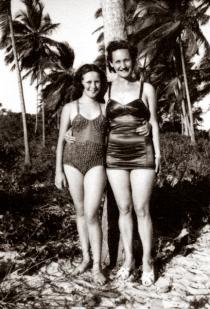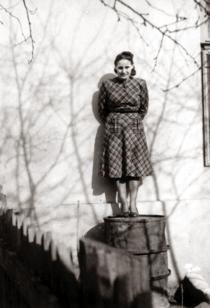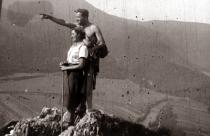Ivan Pasternak
Bratislava
Slovakia
My name is Ivan Pasternak, I'm from Bratislava, and I was born during the
Holocaust. My mother and me survived; my father died in Dachau. I was
hiding with my mother with the help of the Habel family from Devinska Nova
Ves near Bratislava. Grandmother Fanus Habel, Ludvicek, Ilonka, Jozinko and
children from Devinska Nova Ves helped us. The grandmother always knew in
advance about the fascist roundups. When it was announced for Devinska Nova
Ves, we had to move to Lamac to her relatives. And when the roundup was
expected in Lamac, we moved back to Devinska Nova Ves. The roundups
happened very often. They were looking for Jews. I wonder if it was due to
my mother's upbringing or if it was God's will, but I never cried on such
dangerous occasions. After the Holocaust we visited this family for the
first and unfortunately last time in 1947. The grandmother got ill; the
children moved to various places. We are still in correspondence with them.
Family background">Family background
My parents come from Presov. My mother's maiden name was Preisova. My
grandmother was Helena Preisova, nee Rotmanova. My grandfather was called
Eliezer Preis. We have a menorah at home with the engraving Eliezer Preis.
Their three daughters Katarina, Nely and my mother Marta attended school on
Konstantinova Street in Presov. My mother was born in August 1916. My
grandparents lived in a house with a nice verandah on Sabinovska Street.
The eldest daughter, Katarina, liked to sit there in a wicker-chair reading
novels. My mother used to tell her: Don't read so much, your eyes will get
bad. Now, that she is 80, she is partially blind.
The head teacher of my mother and her sisters was Ms. Bednarova, who was a
nun and a good friend of our family. The nuns were prosecuted later, in the
communist era, and they were forced to move from Presov to Bacs near
Dunajska Streda. I saw Ms. Bednarova when she was over 70 on the occasion
of the visit of my aunt Nely, who lived in Nairobi, Kenya. My uncle Sani
Gellert and Aunt Nely lived in Nairobi during World War II. They could save
their lives thanks to businessman Bata 1. He could see that the situation
in Central Europe wasn't good for Jews so he decided to send them to his
branch in Nairobi. My aunt and her daughter were cooking for the workers in
the Bata factory and this way earned money to survive the war. My uncle
Sani fought in the Czechoslovak Army in Egypt. All the family survived and
after the war a son, Andrew, was born, my cousin, who lives in London.
Our family has always been keen on sports. I have photos of both my
mother's sisters at a Presov swimming pool near the Torysa river. The
Jewish youth, members of the Maccabi 2 association, used to meet there.
Both sisters and their husbands liked to go for long walks. Both husbands
graduated from Charles University in Prague and then became doctors in
Zlin. They used to play tennis in Zlin.
During the war
Sad memories are connected with the early 1940s. The eldest sister,
Katarina, who lived in Kosino, which was part of Hungary then, came to
visit her parents. They didn't know that this was to be their last
encounter. My grandparents died in the Holocaust. They were deported in
1942 and perished in Auschwitz in 1945.
My father's family was called Pasternak. They were forwarding agents but
they were very keen on giving their children the best education possible.
My father's best friend was an English teacher. My grandmother was Rozalia
Pasternakova, nee Grossmanova; she died in 1944. My grandfather was called
Emanuel Pasternak. In June 1941 the whole family was still in Presov. They
lived on 14, Kovacska Street. I have a picture of the whole family in the
backyard of the house. My parents are sitting on the bench. My father's
younger brother Vojtech Pasternak is there with his wife Etela. At that
time he was a soldier with the Czechoslovak Army in Ruthenia [see
Subcarpathia] 3. I didn't know his brother Zoli; he died in the
Holocaust. William Pasternak, my father's other brother, was a high
military officer. He was a representative of the Jewish community in Presov
and a deputy of the Presov council. He had a son, Tomas, my cousin, who
died along with his father and my father in Dachau in 1945. Members of the
family, who escaped deportation for a certain while, had a special
exemption for 'economically important Jews'.
Presov was the first town where Jews had to be specially marked. They had
to wear white strips even before the rule about wearing yellow star came
into effect. I have a photo of my father that was taken for the
registration in police archives.
My parents Teodor Pasternak and Marta Pasternakova, nee Preisova, got
married on 1st January 1940. The wedding was held in a Neolog 4 synagogue
on Konstantinova Street in Presov. Their friends Edita and Pali Fraenkl got
married on 26th January 1941. The Fraenkl family survived the Holocaust by
escaping to Hungary. Once they were hiding in Gzongzos, when Horthy 5
groups were doing a roundup searching for Jews. The Fraenkls were hiding in
the loft and when the soldiers came to the fifth floor the whistles ordered
the soldiers to leave. More than 50 Jews were arrested and deported from
that house only. The Fraenkls had two children: Jancsi, who was born in
December 1945 and Elzi, who followed five years later. Their son Jancsi is
still a member of the Presov Jewish community.
My parents were very sociable people. The Jewish social life in Presov was
quite rich. The Jewish youth used to meet at a place where a swimming pool
was built later. They established a Jewish association called Fortuna. They
organized trips, social events and religious ceremonies in Presov.
The Maccabi association organized trips on the river Torysa, to the High
Tatras and also abroad. My father used to plan the trips. Already in 1926
Maccabi had over 50 members interested in tourism. They were mostly men,
but also about ten women. Most of my parents' friends, for example the
Gellert family, didn't survive the Holocaust.
My father was an eager football player. He played for Maccabi Presov. This
was a strong team; on 31st May 1924 the Maccabi football club won 2:1 over
Torokves in Presov. Torokves played in the National Football League,
whereas the Maccabi players were all amateurs. The football team was based
in a working class district nicknamed Mexico Platz [Mexico Square].
Post-war">Post-war
My mother and me survived and came back to Presov after the war. Our return
was a bit delayed because the trains only started running in June or July
twice a week from Bratislava to Zilina. In Zilina we had to wait for a day
for a train from Zilina to Kosice and from there we continued on a horse
carriage to Presov.
I graduated from university and stayed in Bratislava. I'm a teacher. My
mother lived here too; she died a while ago. I'm married, my wife's name is
Zuzka. She is a doctor and she is Jewish. We have two sons, Teodor and
Peter, who are both single.
Glossary">Glossary
1 Bata, Tomas (1876-1932)
Czech industrialist. From a small shoemakingbusiness, he built up the largest leather factory in Europe in 1928,
producing 75,000 pairs of shoes a day. His son took over the business after
his father's death in a plane crash in 1932, turned the village of Zlin,
where the factory was, into an industrial center and provided lots of
Czechs with jobs. He expanded the business to Canada in 1939, took a
hundred Czech workers along with him, and thus saved them from becoming
victims of the Nazi regime.
2 Maccabi World Union
International Jewish sports organization whoseorigins go back to the end of the 19th century. A growing number of young
Eastern European Jews involved in Zionism felt that one essential
prerequisite of the establishment of a national home in Palestine was the
improvement of the physical condition and training of ghetto youth. In
order to achieve this, gymnastics clubs were founded in many Eastern and
Central European countries, which later came to be called Maccabi. The
movement soon spread to more countries in Europe and to Palestine. The
World Maccabi Union was formed in 1921. In less than two decades its
membership was estimated at 200,000 with branches located in most countries
of Europe and in Palestine, Australia, South America, South Africa, etc.
3 Subcarpathia (also known as Ruthenia, Russian and Ukrainian name
Zakarpatie)
Region situated on the border of the Carpathian Mountains withthe Middle Danube lowland. The regional capitals are Uzhhorod, Berehovo,
Mukachevo, Khust. It belonged to the Austro-Hungarian Monarchy until World
War I; and the Saint-Germain convention declared its annexation to
Czechoslovakia in 1919. It is impossible to give exact historical
statistics of the language and ethnic groups living in this geographical
unit: the largest groups in the interwar period were Hungarians, Rusyns,
Russians, Ukrainians, Czech and Slovaks. In addition there was also a
considerable Jewish and Gypsy population. In accordance with the first
Vienna Decision of 1938, the area of Subcarpathia mainly inhabited by
Hungarians was ceded to Hungary. The rest of the region was proclaimed a
new state called Carpathian Ukraine in 1939, with Khust as its capital, but
it only existed for four and a half months, and was occupied by Hungary in
March 1939. Subcarpathia was taken over by Soviet troops and local
guerrillas in 1944. In 1945, Czechoslovakia ceded the area to the USSR and
it gained the name Carpatho-Ukraine. The region became part of the
Ukrainian Soviet Socialist Republic in 1945. When Ukraine became
independent in 1991, the region became an administrative region under the
name of Transcarpathia.
4 Neolog Jewry
Following a Congress in 1868/69 in Budapest, where theJewish community was supposed to discuss several issues on which the
opinion of the traditionalists and the modernizers differed and which aimed
at uniting Hungarian Jews, Hungarian Jewry was officially split into two
(later three) communities, which all built up their own national community
network. The Neologs were the modernizers, who opposed the Orthodox on
various questions.
5 Horthy, Miklos (1868-1957)
Regent of Hungary from 1920 to 1944.Relying on the conservative plutocrats and the great landowners and
Christian middle classes, he maintained a right-wing regime in interwar
Hungary. In foreign policy he tried to attain the revision of the Trianon
peace treaty - on the basis of which two thirds of Hungary's territory were
seceded after WWI - which led to Hungary entering WWII as an ally of
Germany and Italy. When the Germans occupied Hungary in March 1944, Horthy
was forced to appoint as Prime Minister the former ambassador of Hungary in
Berlin, who organized the deportations of Hungarian Jews. On 15th October
1944 Horthy announced on the radio that he would ask the Allied Powers for
truce. The leader of the extreme right-wing fascist Arrow Cross Party,
Ferenc Szalasi, supported by the German army, took over power. Horthy was
detained in Germany and was later liberated by American troops. He moved to
Portugal in 1949 and died there in 1957.




















































